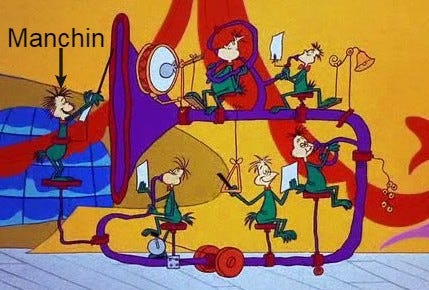The Child Tax Credit and the Earned Income Tax Credit Need Each Other
Each helps the other work
A new study (which may or may not tell us anything) found that cash aid to poor mothers may improve babies’ brain development. I think that’s great news, because frankly: Babies could use the help. It’s goddamned ridiculous how helpless babies are; for at least a year, they’re basically a sack of cornmeal that poops. Compare that to a newborn foal, which can walk within hours, or an elephant, which knows how to use its trunk when it’s born. A giraffe can ice skate before it’s a month old; a beluga whale can play the opening riff to “Sunshine Of Your Love” within its first week. Anything that speeds a human baby down the developmental curve seems like something worth pursuing.
The baby brain development study points to a possible benefit of the Child Tax Credit (CTC) in the Build Back Better bill, which has fallen behind a radiator in the Senate cloak room but could be revived if someone finds it. The concept of an enhanced CTC has support from leftists, liberals, and even the occasional conservative. Another important part of the bill — a beefed up Earned Income Tax Credit (EITC) — also has broad support amongst policy wonks. And yet, we haven’t exactly scheduled a National Jubilee to celebrate these measures. Almost all Republicans oppose them, and some progressives are upset that they fall short of the full overthrow of capitalism that Biden promised (he did promise that, right?). Support is tepid; I stood up in a Burger King last week and yelled “Who here’s horny for the Earned Income Tax Credit?!?!” and people looked at me like I was nuts.
Personally, I think we should be very, very horny for these measures. That’s partly because I think that these policies work well together in a way few people have recognized. The CTC gives people cash whether they work or not, which some people see as a feature, while others see it as a bug. The EITC is the opposite: You have to work a job to get it, which, again, some people like and some people don’t. But the right should realize that the EITC reduces the chance that the CTC will encourage laziness, and the left should realize that the EITC makes a robust CTC possible. Some of the most salient concerns about either are addressed by the presence of the other.
Let’s start with this: No sane person wants to work. We all have some patter that we tell ourselves about our job, some shit about how work “provides a sense of fulfillment” or “helps me know I’m making a difference”. This is bullshit. This is post-hoc rationalization to keep us from slitting our wrists when our alarm clock goes off at 7AM. If any of us could procure food, clothing, and shelter while sitting in a bubble bath eating doughnuts, we would do it. If this blog ever suddenly disappears, it’s because my lotto numbers came in and I’m dropping this newsletter like a hot rock to pursue my dream of playing Halo for 20 hours a day and committing suicide by fudge.
Given this reality, people who work are rightfully galled by the idea of someone abusing the system to avoid working. This is such a fundamental sentiment that it was captured 2,500 years ago in the fable of The Ant and the Grasshopper. In that story, an industrious ant spends all summer collecting food, while a grasshopper sings the summer hours away. When winter comes, the grasshopper begs the ant for food, at which point the ant cups his pretty-large-for-an-ant genitals and says “I’ve got somethin’ you can eat right here.” The idea of one person — or ant — working so that another can loaf violates our basic sense of fairness, and I think liberals should always recognize that working people have every right to be massively pissed off by this possibility.
Liberals did, at one point, manage to design a system that actively discouraged work. The welfare programs that existed before Clinton-era reform sometimes discouraged work because benefits cut off steeply above certain income levels. Reagan’s “welfare queen” narrative was an exaggeration, but some people did decide not to work. After all, you didn’t have to be lazy or mendacious to make that choice: You just had to be rational. Imagine you’re a person with not-very-great job prospects. You can either: A) Not work and collect $11,000 a year, or B) Get up every goddamned day and go to your job as a hotel maid, clean hair out of tub drains, scrub toilets, collect trash that people were too fucking lazy to throw away themselves, pick fries up off the floor, clean up ketchup that got on the fucking ceiling somehow, and change more semen-soaked sheets than you’d encounter if you worked in porn for 100 lifetimes. For this, you get $13,000 a year. Obviously, most people will just make the $11,000 stretch.
The ghost of this poorly designed policy is still stalking us. In response to the study about cash aid and child brain development, Robert Rector of the Heritage Foundation said “If you actually believe that child poverty has these negative effects, then you should not be trying to restore unconditional cash aid. You certainly don’t want to go in the business of reversing welfare reform.” I think this is a straw man: Rector seems to be arguing against the old welfare system, as evidenced by his warning that we shouldn’t “reverse welfare reform”. That isn’t what’s being proposed. It’s a bit like people are suggesting mental health care reform, and Rector is saying “But let’s not go back to full lobotomies.” Right. Nobody said that.
Of course, it’s also important to notice what Rector isn’t arguing. Some opponents of the CTC are afraid that people who don’t “deserve” it will get it. Which brings up the issue of whether we should subsidize kids even if their parents are sketchy, and I’m a “yes” on that question, but I recognize that there are conceptual limits to that “yes”. Rector is making a different argument (at length here): He’s saying that poorly-designed programs trap people in poverty, which harms kids. And remember: Even liberals like myself (or Matt Yglesias or Dylan Matthews) believe that the old welfare system did discourage work and keep people in poverty. So: Would an enhanced CTC harm kids by encouraging their parents to stay poor forever?
I think the answer is clearly “no”. There are two important differences between the old system and the CTC. The first is that the old system phased out benefits as people earned money. Consider my hypothetical would-be hotel maid: Getting a job only netted her $2,000 under the old system, because earning $13,000 in wages caused her to lose $11,000 in benefits. But if benefits don’t phase out, getting a $13,000 job would net her $13,000. Under those conditions, she’d probably opt for the “your soul for a Nissan Altima and a Netflix subscription” devil’s bargain that most of us choose to make.
The second big difference is that CTC is simply not enough to live on. The proposed hike is from $2,000 per child to up to $3,600; unless you enjoy Captain von Trapp levels of fertility, that $3,600 per kid is not going to be the ticket to a life of luxury. A few two-income households may choose to down go to one income, and some people may switch from full-time work to part-time, but these strike me as routine and not-societally-damaging life choices. If nothing else, it’s categorically different from the system that forced people to choose between being a shrewd person trapped in poverty and a total sucker trapped in poverty.
Like I said: The CTC has broad support on the left. It’s easy to administer, easy to collect (those things matter), and the experiment with an enhanced CTC in the American Rescue Plan reduced child poverty by a lot. It’s good when money gets to people who need it without a complicated process. Just as we should remember that it’s annoying when people cheat their way out of work, we should also remember that every hour spent dealing with bureaucracy brings the average person 10 percent closer to becoming Michael Douglas in Falling Down. Most families who are eligible for the CTC will collect it, which is good, because a baby is unlikely to fill out form 4002.1-C and deliver it to the Department of Social Services themselves.
Simplicity is the main reason why many people are bullish on the CTC. They see this type of aid as the future of welfare, especially if it can be made less conditional and more automatic. I agree, but I see a problem down the line if we keep bumping up cash payments. Eventually, we would reach a point where it would only sort of make sense to work; benefits might eventually get so generous that some people would decide “to hell with work — I’ll just sit here and collect checks.” This will inevitably be unpopular; consider that voters in Switzerland recently rejected a plan to give people unconditional aid of about $2,525 a month by a 77-23 margin. And that’s Switzerland, where West Virginia senators wield little power. As cash aid grows relative to wages, the “people sitting around” problem becomes more real.
And that’s where the Earned Income Tax Credit comes in. The EITC subsidizes work; it basically adds a few coins to every dollar earned by low-income workers. The more we enhance the EITC, the more we can enhance cash payments while maintaining a large cash-aid-to-wages gap. That is: It would still make a lot of sense to get a job. That would be especially true if the EITC started with the first dollar you earn (and I think that it should) instead of phasing in. After all: If a job nets, say, $1.30 on the dollar for the first few thousand dollars a person earns, then people have a big incentive to table my Halo-and-fudge fantasy and get a job. Raising the EITC is a far better way to incentivize work than our labyrinthine system of work requirements, which is clunky, bureaucratic, and basically works about as well as a dildo made of gingerbread.
It’s hard to say who “deserves” aid. Deserving is a blurry concept, and it doesn’t snap into focus when applied to the individual circumstances of 330 million Americans. And yet, I feel comfortable saying this: Anyone who works a low-wage job deserves a boost. Low-wage jobs are hard; I have personally experienced a perfectly inverse relationship between how hard a job is and how much it pays. Our country is lucky to be rich enough that we can enhance the salaries of waitresses, delivery guys, health care workers, and line cooks so that they can earn a decent living. This isn’t charity, it’s insurance, because most of us will be at different points along the wage spectrum at different times in our lives. By boosting wages through the EITC, we also create space for broad-based cash aid through things like the CTC. This makes it possible to provide cash aid without distorting the labor market or wading into the inherently murky waters of what the fuck the word “deserve” means.
The general sense in the zeitgeist is that the Biden presidency is going about as well as the fur trapping expedition in The Revenant. The public is disappointed, Democrats are disillusioned, and Republicans are absolutely giddy over Biden’s cratering poll numbers. It’s fair to wonder: Is anything good going to come of this presidency other than getting rid of Trump? Though, to be fair, if Biden had beaten Trump and then William Henry Harrison’d himself into an early grave, the mere fact that he beat Trump would still make him a successful president in a very real way.
I think we’re losing sight of the fact that progress on things that matter is still possible. Personally, I could give a baby stoat’s ass if that progress constitutes the “transformational change” that gets progressive activists’ blood pumping. I am fine with lame, humdrum, trite progress that delivers much-needed nutrients to babies’ brains. If we manage to devote a couple hundred billion towards that goal, then that’s really something.
The legislative process is not an elegant machine. It’s a big, stupid, Dr. Seuss-style contraption, basically the electro who-cardio floox, with Joe Manchin as the conductor. It’s this:
Any time anything good gets belched through this process, we should take note. The child health provisions in Build Back Better are — somehow, miraculously — actually pretty good. The Child Tax Credit and enhanced Earned Income Tax Credit are chocolate and peanut butter: Good on their own, but even better together. If Build Back Better somehow gets revived from its coma and passed, then the slightly-less-useless babies alone will be something to celebrate.









Excellent piece. I just may have to become a subscriber!
The problem with your argument is that the "new study" you base your hopeful thoughts on is bunk. Scott Alexander has a deep study on it in Astral Codex Ten, with the summary conclusion "it’s basically a typical null-result-having study. The authors should not have reported their result as positive, and the media should have challenged their decision to do so rather than uncritically signal-boosting it." In other words, wouldn't it be pretty to imagine that CTC would help baby cognitive development . . . but it does not, so pretending it does is not really helpful.